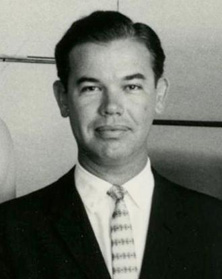
Homer E. Hooks (1921)
Inducted 2013
Highlights
After serving in World War II, Hooks was hired at the Tampa Tribune as a full-time citrus correspondent, the first writer of this kind. His articles focused on industry issues, from production to exports. He left the Tribune to become Executive Secretary for the Canners League of Florida where he organized a new trade association of independent processors. This would lead to numerous other notable positions within several different companies. He eventually became General Manager of the Florida Citrus Commission, becoming a well-respected spokesman for the industry in Tallahassee & Washington, D.C. He worked closely with Professor Thomas Mack to establish the Florida Citrus Archives.
- Tampa Tribune
- Canners League of Florida
- Lakeland Highlands Canning Company
- Florida Citrus Canners Cooperation
- H. P Hood and Sons
- Florida Citrus Commission
- Florida Citrus Archives
Bio
Homer Hooks was born in Clermont, Florida, in 1921. He attended the University of Florida and studied journalism. There, he was the editor for the Alligator and was elected to Phi Beta Kappa. He went on to serve in World War II in the 102nd Infantry as a platoon leader in the Rhineland and Central Germany campaigns. Hooks was awarded two bronze stars for valor, the oak leaf cluster for merit, and the Purple Heart.
After the war, Hooks accepted a position as the Tampa Tribune citrus correspondent, becoming the first full-time writer of this kind. His articles focused on the problems in the industry—production, marketing, quality of fresh and processed products, legislation, and exports. In 1948 Hooks left the Tampa Tribune to become the Executive Secretary for the Canners League of Florida. There, he organized a new trade association of independent processors who felt the need for an organization to represent their views. He also made many trips to Washington D.C. to argue for more equitable tax structures. In 1950 Hooks accepted a position as Vice-President of Marketing in the Lakeland Highlands Canning Company. Here he worked primarily on the marketing problems in the industry until he was recalled to the army in 1951 during the Korean War. But soon Hooks returned to central Florida to become marketing manager for Florida Citrus Canners Cooperation (now known as Florida’s Natural Growers). In this position Hooks developed strategies to reach the European market. Hooks made numerous trips to Europe to establish a broad-based export program in Europe for processed citrus products. This strategy was used as a template for a later industry-wide marketing strategy. In 1956, Hooks became the General Manager for H. P. Hood and Sons and essentially built the company from scratch.
In 1957 Hooks reached the high point of his career when he was named the General Manager of the Florida Citrus Commission (now known as Florida Department of Citrus). Here he had many great achievements which guided the Florida citrus industry through some of its most tumultuous times. After the 1957 and 1962 freezes, Hooks launched a nation-wide advertising campaign to reassure buyers that Florida citrus was still a safe and wholesome product. Hooks also led the battle against synthetic products like “Tang” and “Awake.” He was successful in convincing the Federal Trade Commission to ban the misleading advertising of these products. Hooks became a respected and effective spokesman for the industry in Tallahassee, Washington, major markets in the United States, and in the capitals of Europe. Under Hooks’s leadership the industry successfully lobbied Congress to retain tariffs. Hooks’s eight years as commission head were crucial to moving the industry forward into the modern era. During his tenure, the Florida Citrus Commission’s advertising was modernized and professionalized. He initiated the “Sell Florida First” campaign which urged shippers to identify “Florida” on labels.
Though he left the Florida Citrus Commission in 1965 to head the Florida Phosphate Industry Council, he continued to make important contributions to the industry in numerous ways. One example was his continual support of the Citrus Program at Florida Southern College. Hooks worked closely with Professor Thomas Mack in establishing the Florida Citrus Archives which lives today in the Sarah D. and L. Kirk McKay Archives Center on the Florida Southern Campus. The priceless collection of official records and memorabilia that record the industry exists today owes much to the fund-raising efforts of Hooks.
